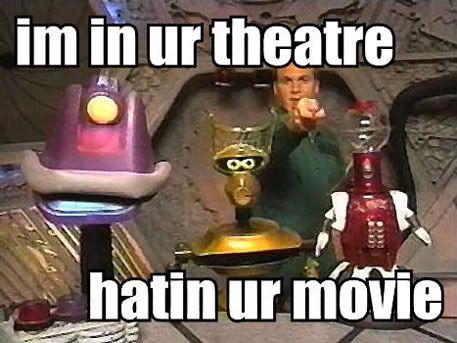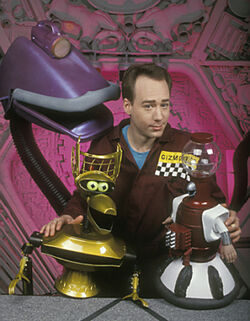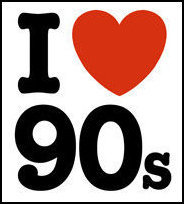 I know, I know, LOLcatz is probably the lowest form of humor, but when I saw this picture I couldn't resist.
I know, I know, LOLcatz is probably the lowest form of humor, but when I saw this picture I couldn't resist.Often when I watch movies with other people, they tend to grumble over an admittedly irritating habit of mine. My movie-mates beg and plead with me, "Can you please stop talking and making fun of this movie? You're completely ruining it for me." I pity these people, of course, because obviously they were not Mystery Science Theater 3000 fans as kids. If they had been, they would be well aware that this so-called annoying constant verbal mockery of mine was actually making it better.
Okay, so maybe I'm no Joel Robinson, but I swear, give me a couple of Bots and a space-based movie theater that exclusively plays B-movies and I'll hit it out of the park.
Mystery Science Theater 3000 (MST3K to uber nerdy die-hards like, ahem, myself) was an ingenious low-budget project that made its premiere on a local cable access channel in my hometown of Minneapolis. The concept was brilliant, innovative, and dirt-cheap to produce. The show's creators simply sought out the most terrible, unwatchable, most retina-burning feature films they could find, superimposed a couple of silhouettes across the bottom of the screen to give the illiusion of a movie theater environment, and spent the entire duration of the film mocking every conceivable element.
It had an intentionally shaky premise that made it incredibly easy for Joel and the Bots to poke fun not only at the movies, but at their own environment and circumstances as well. In one of the most literal, lengthy, and informative theme songs ever, we get the incredibly detailed and implausible series of events that led up to this B-movie imprisonment scenario:
The creators aimed for a low-budget look, at first for necessity on public access and later to stay true to their roots. The intro exemplified the tongue-in-cheek attitude of the show, particularly with the line:
"If you're wondering how he eats and breathes
And other science facts,
Just repeat to yourself 'It's just a show,
I should really just relax.'"
The theme also introduces us to Joel's robot friends (who he assembled out of the "start" and "stop" functions for the Satellite of Love movie theater, of course). The Bot gang was comprised of Cambot (allegedly recording these events and thus unseen), Gypsy, Crow T. Robot, and Tom Servo. They, along with Joel (and later, Mike) provided us with countless hours (really, countless, each show was incredibly lengthy) of ridiculous riffs and jabs.
 Our lovable metalheads from left to right: Gypsy, Crow T. Robot, and Tom Servo. Image via CollegeCandy.com
Our lovable metalheads from left to right: Gypsy, Crow T. Robot, and Tom Servo. Image via CollegeCandy.comThe show never took itself too seriously, as the underlying concept of the show was to mock everything and anything both mercilessly and relentlessly. In the case that you were never a fan in your youth (and may I just say, for shame!), I am about to launch into my MST3K proselytizing. You've been warned.
The true genius of the show was its commitment to utmost simplicity and maximizing humor. They did very little in the way of continuity or character development in ways that watered down the full-speed-ahead-ness of its comedic contemporaries. The closest they came to any sort of plot development was in the form of brief preliminary, closing, and pre-commercial break skits like the following:
The above clip is from my all-time favorite episode, The Final Sacrifice,for which I have such a strong and fervent love that I feel the compelling need to post the entire 90 minute episode right here on my blog. Yep, I totally just did that. Please watch at your leisure.
If you've never watched the show, this is a prime specimen with which to pop your proverbial MST3k cherry. Seriously. Go ahead. Watch it. I'll wait.
Okay, presumably it's an hour and a half later, and you're now a full MST3K believer, so you'll probably far more interested in what I have to tell you. Good, good. I'm glad we could make to this point together.
The show went through many incarnations as it's network home and time slots changed over the years. Though it began on public access, it was soon thereafter picked up by Comedy Central, the show's home for five seasons of glorious unfettered riffing and due mockery. Joel Hodgson, the original trap-ee aboard the SOL (Satellite of Love) left during the 5th season and was swiftly replaced with Mike Nelson. Lucky for the show, the premise was so thin it was incredibly easy to pull off such a major switcharoo. While to other shows this may have been a critical shark-jumping moment of disaster, MST3K was able to emerge from the change generally unscathed.
Two years later, the show was picked up by the Sci Fi network (after much begging and pleading from fans) presumably based on its vaguely sci-fi Satellite of Love premise and robot sidekicks. The show's producers had to re-tailor the movies' themes in new epsiodes to better fit the Sci Fi cannon, but generally the show continued on its planned trajectory for another good few years until its unfortunate cancellation in 1999. Lucky for all of you, the geeks and nerds who adored this show are technically savvy enough to make most episodes available to all of us right here on the interweb.
The show now has a formidable cult following, which is unsurprising as it has a distinct appeal to the incredibly nerdy people who tend to be in charge of rounding up cult followings. I suppose after this brief foray into MST3K missionary work, I too can add myself to that list. The real appeal of the show is the bam-bam-bam flow of constant jokes. Sure, some of the references are thinly-veiled obscure inside jokes and others may not be as culturally relevant now as they once were, but for the most part, their mocking is timeless. Though trends and references may come and go over the years, there is one thing we can all agree on: making fun of everything.
In case you're not a full-fledged MST3K fan by now, I leave you with a few of my favorite Mystery Science Theater 3000 shorts:
Are You Ready for Marriage?
Cheating
Body Care and Grooming
Posture Pals









